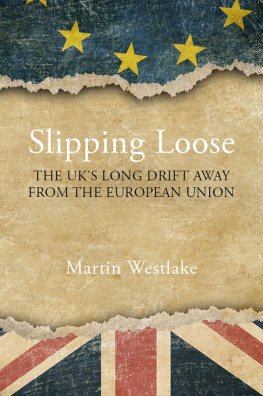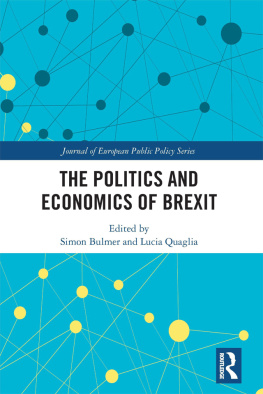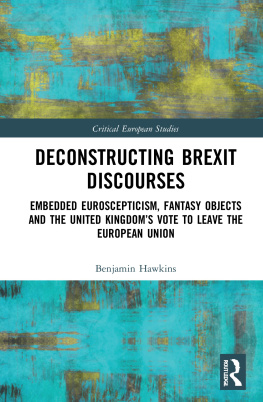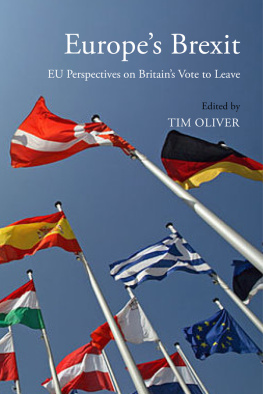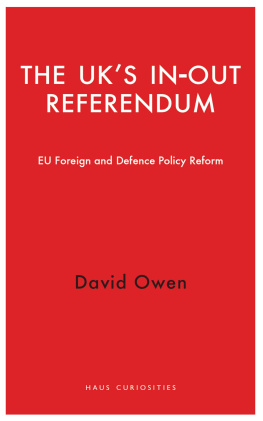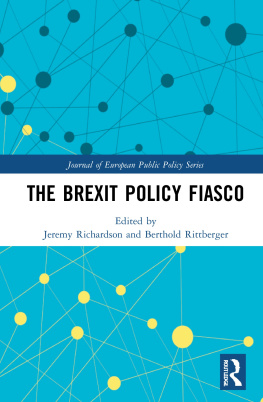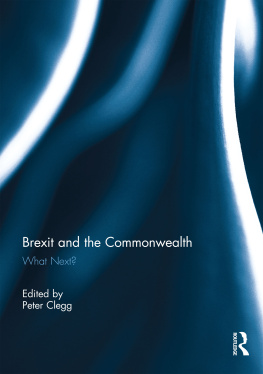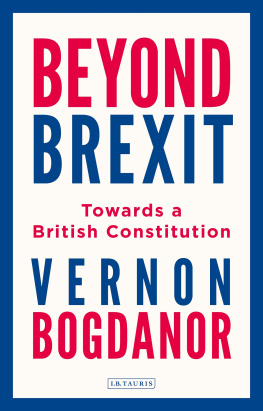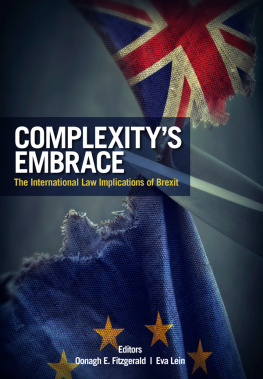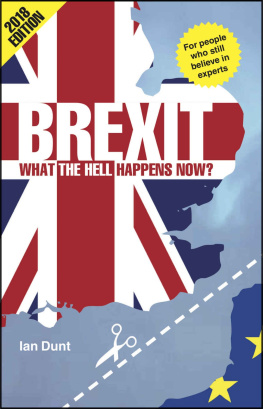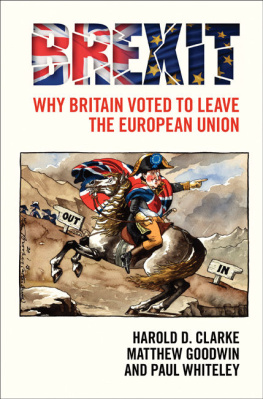To Europe all of it.
Martin Westlake 2020
This book is copyright under the Berne Convention.
No reproduction without permission.
All rights reserved.
First published in 2020 by Agenda Publishing
Agenda Publishing Limited
The Core
Bath Lane
Newcastle Helix
Newcastle upon Tyne
NE4 5TF
www.agendapub.com
ISBN 978-1-78821-201-4
British Library Cataloguing-in-Publication Data
A catalogue record for this book is available from the British Library
Typeset by Newgen Publishing UK
Printed and bound in the UK by CPI Group (UK) Ltd, Croydon, CR0 4YY
I hope this study will be of interest to all sides in the ongoing Brexit debate, in the United Kingdom and on the Continent. I hope, in particular, that its analyses will be seen as a corrective or, at the least, an alternative to the current, shorter-term explanations about what happened or, for those on the remain side of the argument, what went wrong. It will give some comfort to those who argue that continued full EU membership was becoming practically and politically impossible for the UK while also comforting those who argued that the UK would have done better to have established and maintained a new relationship from the inside. While not an apologia for David Cameron and his ill-fated decision to promise a referendum, the study sets that decision and its consequences in the broader context of an EU member state that had, in retrospect, been slipping its moorings for some considerable time.
This is an academic study and I hope that I have been suitably objective in my analyses. But I would like, at the outset, to nail my personal colours firmly to the mast. I campaigned energetically for remain in 2016 and, if I had not long ago lost my vote to the 15-year-rule, I would have voted accordingly on 23 June that year. I believe the UKs decision to leave the EU is bad both for the UK and the EU. And if, by some chance, the UK were to remain fully in the EU, I would be conditionally content. However, under those circumstances I would be the first to argue that the UKs longer-term relationship with the EU would need to be settled satisfactorily for both sides. That would involve the UK recognizing once and for all that the EU is a progressive evolutionary process and not a fixed state. It would also involve the UK elaborating a proper strategy perhaps in agreement with the EU rather than reverting to the traditional unilateral policy of ad hoc tactical reactions and rear-guard braking actions. It would also involve the EU recognizing the UKs continued exceptionalism in return for its continued sincere cooperation. To be fair, the EU has always gone out of its way to do just that. In that context, I believe that the February 2016 New Settlement negotiated between the EU and the Cameron government was an extraordinary achievement (achieved by both sides, it should be stressed) that deserved a better fate and whose provisions, I hope, may yet be revisited. It was perhaps the closest UK and EU policy-makers had ever come to the Holy Grail of a permanent settlement between a reticent state and a permanently evolving organization.
This is intended to be primarily a study about trends and their consequences, and not about individuals and their decisions. The study is definitely not about apportioning responsibility and certainly not about pointing fingers and affixing blame. In the first place, having served for 30 years as a civil servant, I am instinctively averse to public criticism of political authorities who act on the basis of their frequently hard-won democratic legitimacy. For as long as they have an electoral mandate they are perfectly entitled to take decisions as they best see fit; that is, after all, the basic logic of the system. In the second place, having been a political scientist for some 40 years, I have long since understood democratic systems fundamental need for politicians facile as that may sound. There is, in particular, no sense in accusing a politician of behaving politically what other way would we have politicians behave? In the third place, having worked close to, and closely with, politicians for a long time (and written the biography of one), I think I have a pretty good idea about what an extraordinarily difficult and demanding job it can be and I am, frankly, respectful of those who choose such a vocation. In the fourth place, I believe, rightly or wrongly, that politics is symptomatic as much as it is causal. Mediators primarily the traditional media but increasingly the social media understandably render politics intelligible through their concentration on individuals and personalities, but the basic argument of this study is that underlying trends, and their consequences, have provided the scene changes against which the politicians have had to act.
For anybody who would like better to understand those scene changes, the extraordinary challenges that postwar British politicians have had to face and the conscientious devotion and sheer hard work that generations of British (and EU) politicians and civil servants have put into trying to establish and maintain a mutually satisfactory relationship between the United Kingdom and the European Union, I heartily recommend Myriam Camps contemporary history (1964), the Milward () Official History series of studies. It is particularly fascinating to see the competing visions in the 1950s between the liberal internationalism of a free trade area and the almost inevitably federalist tendencies of a customs union. In no small sense, that debate is being relived again now.
Tucked away in Walls second volume, covering the 197585 period, there is a fascinating account of the last moment at which a European triumvirate might have been established (Wall : 133). The rest, as they say, is history.
This study, commissioned and mostly locked into the production process at a time when the United Kingdom was still largely expected to be leaving the European Union at 11 oclock (British Time) on the evening of 29 March 2019, gives three hostages to fortune. The first is the (still) ongoing ramifications of the 2326 May 2019 European elections. The second is the ultimate outcome of the UKs ongoing negotiations, with an extension of the two-year period provided for under the Treaty on European Union (TEU) Article 50 to 31 October 2019 (and perhaps beyond). The third is David Camerons account of his time in office, For the Record, published only in September 2019. I am grateful to David Cameron for granting me a May 2019 interview that enabled me to check my theories. Thanks to the excellent team at Agenda Publishing, I have been able to incorporate updates at proof stage, but obviously I could not incorporate all of the ramifications of the very latest developments into my analyses. In all frankness, however, these events do not much affect my basic thesis.
I am greatly indebted to Agenda Publishing and in particular to my editor Alison Howson for taking on this study and turning it around with great speed and professionalism. I have been immensely fortunate and privileged in having been able to rely on the help and support of a great number of experts in the drafting of this manuscript. My very warmest thanks go to the following: Professor Vernon Bogdanor, who kindly read and commented in detail on manuscript; and James Hanning, Tim King, David Spence and Anthony Teasdale who kindly read and commented on various parts of the manuscript. Last, but by no means least, I am eternally grateful to the ever-understanding Godelieve, who has patiently and supportively tolerated my increasingly manic behaviour as yet another manuscript neared the submission deadline.

